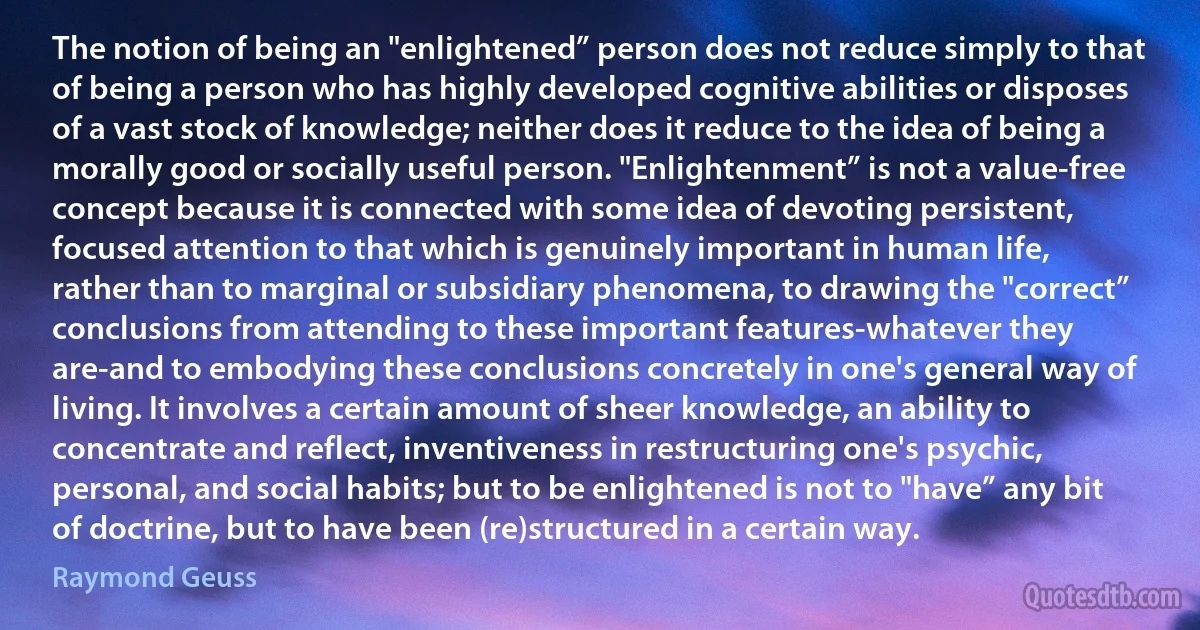
The notion of being an "enlightened” person does not reduce simply to that of being a person who has highly developed cognitive abilities or disposes of a vast stock of knowledge; neither does it reduce to the idea of being a morally good or socially useful person. "Enlightenment” is not a value-free concept because it is connected with some idea of devoting persistent, focused attention to that which is genuinely important in human life, rather than to marginal or subsidiary phenomena, to drawing the "correct” conclusions from attending to these important features-whatever they are-and to embodying these conclusions concretely in one's general way of living. It involves a certain amount of sheer knowledge, an ability to concentrate and reflect, inventiveness in restructuring one's psychic, personal, and social habits; but to be enlightened is not to "have” any bit of doctrine, but to have been (re)structured in a certain way.
Raymond GeussRelated topics
ability attention bit certain cognitive concentrate concept correct doctrine embodying general good human idea knowledge life living marginal person psychic subsidiary vast way restructuringRelated quotes
As for one-party rule, it was questioned neither by the Left Opposition nor by the Right [wing of the Communist party]. All were prisoners of their own doctrine and their own past: all had worked with a will to create the apparatus of violence that crushed them. Bukharin' s hopeless attempt to form a league with Kamenev was no more than a pitiful epilogue to his career. In November 1929 the deviationists performed a public act of penance, but even this did not save them. Stalin' s victory was complete; the collapse of the Bukharinite opposition meant the triumph of autocracy in the party and in the country. In December 1929 Stalin' s fiftieth birthday was celebrated as a major historical event, and from this point we may date the "cult of personality". Trotsky' s prophecy of 1903 had come true: party rule had become Central Committee rule, and this in turn had becorne the personal tyranny of a dictator.

Leszek Kołakowski
The social sciences building at the University of Chicago indeed still bears since it was built 40 years ago on its outside an inscription taken from the famous physicist Lord Kelvin: "When you cannot measure, your knowledge is meager and unsatisfactory." I will admit that that may be true, but it is certainly not scientific to insist on measurement where you don't know what your measurements mean. There are cases where measurements are not relevant. What has done much damage to microeconomics is striving for a pseudo-exactness by imitating methods of the physical sciences which have to deal with what are fundamentally much more simple phenomena. And the assumption that it is possible to ascertain all the relevant particular facts still completely dominates the alternative methods of dealing with our constitutional ignorance, which economists have tried to overcome. This of course, is what has come to be called macroeconomics as distinct from microeconomics.

Friedrich Hayek
Nothing can be more untrue than to pretend that the general religious mind of India has not at all grasped the higher spiritual or metaphysical truths of Indian religion. It is a sheer falsehood or a wilful misunderstanding to say that it has lived always in the externals only of rite and creed and shibboleth. On the contrary, the main metaphysical truths of Indian religious philosophy in their broad idea-aspects or in an intensely poetic and dynamic representation have been stamped on the general mind of the people. The ideas of Maya, Lila, divine Immanence are as familiar to the man in the street and the worshipper in the temple as to the philosopher in his seclusion, the monk in his monastery and the saint in his hermitage. The spiritual reality which they reflect, the profound experience to which they point, has permeated the religion, the literature, the art, even the popular religious songs of a whole people.

Sri Aurobindo
Science Of Energetics. Although the mechanical hypothesis just mentioned may be useful and interesting as a means of anticipating laws, and connecting the science of thermodynamics with that of ordinary mechanics, still it is to be remembered that the science of thermodynamics is by no means dependent for its certainty on that or any other hypothesis, having been now reduced, to a system of principles, or general facts, expressing strictly the results of experiment as to the relations between heat and motive power. In this point of view the laws of thermodynamics may be regarded as particular cases of more general laws, applicable to all such states of matter as constitute Energy, or the capacity to perform work, which more general laws form the basis of the science of energetics, - a science comprehending, as special branches, the theories of motion, heat, light, electricity, and all other physical phenomena.

William John Macquorn Rankine
In the last two decades we have witnessed the emergence of the "system" as a key concept in scientific research. Systems, of course, have been studied for centuries, but something new has been added... The tendency to study systems as an entity rather than as a conglomeration of parts is consistent with the tendency in contemporary science no longer to isolate phenomena in narrowly confined contexts, but rather to open interactions for examination and to examine larger and larger slices of nature. Under the banner of systems research (and its many synonyms) we have also witnessed a convergence of many more specialized contemporary scientific developments... These research pursuits and many others are being interwoven into a cooperative research effort involving an ever-widening spectrum of scientific and engineering disciplines. We are participating in what is probably the most comprehensive effort to attain a synthesis of scientific knowledge yet made.

Russell L. Ackoff
